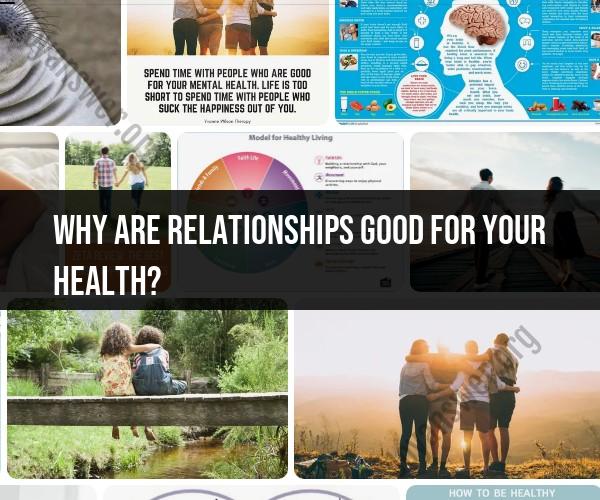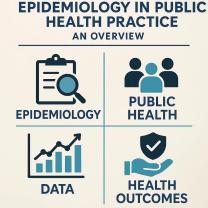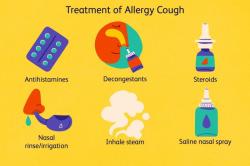Why are relationships good for your health?
Healthy relationships have a positive impact on both mental and physical health. Here are some reasons why relationships can be good for your well-being:
Emotional Support: Relationships provide a source of emotional support. Sharing your thoughts, concerns, and experiences with a trusted partner or friend can reduce stress and anxiety.
Reduced Stress: Having a strong support system in the form of relationships can help lower stress levels. Emotional support, understanding, and empathy from loved ones can provide a buffer against the negative effects of stress.
Improved Mental Health: Positive relationships are associated with better mental health outcomes. They can boost your mood, increase self-esteem, and reduce symptoms of depression and anxiety.
Enhanced Physical Health: Research suggests that people in strong and supportive relationships tend to have better physical health. This may be due to reduced stress, better self-care, and encouragement to maintain healthy habits.
Longevity: Studies have shown that individuals in healthy relationships tend to live longer. Having a supportive partner can lead to healthier lifestyle choices, early detection of health issues, and a reduced risk of chronic diseases.
Resilience: Relationships can provide a sense of resilience in the face of adversity. Knowing that you have someone to lean on during tough times can help you cope with life's challenges more effectively.
Happiness: Positive relationships contribute to overall happiness and life satisfaction. Sharing your life with someone who cares about you can bring joy and contentment.
Social Connection: Relationships promote social connection and reduce feelings of isolation. Loneliness can have negative health effects, so having people to connect with is important for mental and physical well-being.
Healthier Habits: Couples or close friends often influence each other's habits. This can lead to adopting healthier behaviors, such as regular exercise, balanced nutrition, and reduced substance abuse.
Cognitive Benefits: Engaging in conversations and meaningful interactions with others in relationships can stimulate cognitive function and keep your mind sharp.
Stress Management: During times of high stress, supportive relationships can help you cope and manage stress more effectively. This, in turn, can reduce the impact of stress on your health.
Immune System Function: Some studies suggest that healthy relationships may positively influence the immune system. People in strong relationships may have stronger immune responses to illnesses.
It's important to note that not all relationships have these positive effects on health. Unhealthy, stressful, or abusive relationships can have detrimental impacts on both mental and physical well-being. Therefore, it's essential to cultivate and maintain healthy, supportive, and respectful relationships.
While relationships can have numerous health benefits, they are just one component of a holistic approach to well-being. A healthy lifestyle, regular medical check-ups, and self-care are also crucial for maintaining good health.
How do relationships contribute to good health and well-being?
Relationships contribute to good health and well-being in a number of ways, including:
- Reducing stress: Strong social ties can help to buffer the negative effects of stress on the body and mind. When we feel connected to others, we are less likely to experience the harmful effects of chronic stress, such as high blood pressure, heart disease, and depression.
- Promoting healthy behaviors: Strong social ties can also encourage us to adopt and maintain healthy behaviors. For example, friends and family members can support us in our efforts to eat healthy, exercise regularly, and get enough sleep.
- Providing social support: Social support is essential for our emotional and mental health. When we have people to turn to for support, we are better able to cope with difficult times and to bounce back from setbacks.
- Boosting self-esteem: Strong social ties can also boost our self-esteem. When we feel loved and supported by others, we are more likely to feel good about ourselves and our abilities.
What is the link between strong, positive relationships and physical and mental health?
Research has shown that strong, positive relationships are associated with a number of physical and mental health benefits. For example, people with strong social ties are more likely to:
- Have lower blood pressure
- Have lower rates of heart disease
- Have lower rates of stroke
- Have stronger immune systems
- Live longer
- Have higher levels of happiness and well-being
Strong, positive relationships can also help to protect against mental health problems such as depression and anxiety. People with strong social ties are more likely to have coping mechanisms for dealing with stress and to have people to turn to for support during difficult times.
How can nurturing relationships have a beneficial impact on one's overall health?
There are a number of ways in which nurturing relationships can have a beneficial impact on one's overall health. For example, nurturing relationships can:
- Provide emotional support during difficult times
- Help us to cope with stress
- Encourage us to adopt and maintain healthy behaviors
- Boost our self-esteem
- Increase our sense of purpose and belonging
- Help us to feel loved and valued
All of these factors can contribute to improved physical and mental health.
Here are some tips for nurturing relationships:
- Spend quality time with the people you care about.
- Be supportive and understanding.
- Communicate openly and honestly.
- Be forgiving.
- Express your gratitude for the people in your life.
By nurturing your relationships, you can improve your overall health and well-being.













